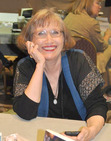Meg Benjamin's Blog, page 16
September 29, 2012
Six Sentence Sunday – Fearless Love
 So today we have a six from Fearless Love, my newest Konigsburg book, coming out from Samhain on October 9. My hero, Joe, has just cooked dinner for my heroine, MG, but he obviously has something else in mind for dessert!
So today we have a six from Fearless Love, my newest Konigsburg book, coming out from Samhain on October 9. My hero, Joe, has just cooked dinner for my heroine, MG, but he obviously has something else in mind for dessert!
“Good, after all of that, I’m starving.” She started toward the cupboard to get the plates, but he caught her around the waist pulling her tight against his body. Apparently, his recovery time was over. He cupped the back of her head and covered her mouth with his.
A few moments later, he raised his head. “I’m starved too,” he growled, “eat fast.”


September 26, 2012
Cooking Thoughts: I Want My, I Want My, I Want My HEB
 I love Colorado: I want to be clear on that. The scenery, the climate, the people—all of it. It is indeed a wonderful place to live. But there’s one thing it definitely lacks: HEB.
I love Colorado: I want to be clear on that. The scenery, the climate, the people—all of it. It is indeed a wonderful place to live. But there’s one thing it definitely lacks: HEB.
Maybe it was when I realized that I couldn’t buy a package of hamburger at my local supermarket that hadn’t had “natural flavoring” added. That, along with the “enhanced” pork that’s all my grocery stocks. And then there’s the fact that although Colorado has a huge cherry industry, all the cherries my grocery sold came from the West Coast. I want my HEB back!
HEB, for those of you who haven’t been to South Texas, is a local grocery chain that dominates the area, extending down into northern Mexico and up into parts of North Texas as well. The founder of the chain, Herman E. Butts, came from Kerrville, in the Hill Country. It is, without question, the best grocery chain I’ve ever shopped.
There is no enhanced meat at HEB. No treated hamburger. Local produce is featured whenever it’s around. They even sell homegrown tomatoes occasionally. If a recipe is featured in the newspaper, you’ll find the ingredients at HEB the next day, no matter how exotic they are. HEB also pays attention to the neighborhood where the store is located. If there’s a demand for Asian veggies, those veggies will start showing up in the produce section. If you want Topo Chico in six packs, you’ll get it. I found a bag of Greek oregano twigs one week at HEB—I have no idea why they’d decided I’d like it, but I do know that I, along with a lot of other people, grabbed it.
Here in the Colorado foothills, I have my choice of three national chain groceries, along with a couple of meat markets. The chains stock their own merchandise, pretty much. I prefer Swanson’s organic chicken broth (the winner of Cook’s Illustrated’s tests). HEB stocked it. Neither chain stocks anything beyond the basic Swanson’s chicken broth because they use the shelf space for their house brand.
Moreover, the decisions about what gets stocked at my local grocery store are apparently made at Company Central, several thousand miles away. If I find a recipe I want to try, one, for example, that I found in the Denver Post, I can’t be guaranteed the ingredients will be around. I spent a fruitless morning trying to find Swiss chard for minestrone one autumn. The grocery didn’t stock it—they considered Swiss chard a winter vegetable, even though Colorado farmers markets had lots of it.
Those farmers markets are a viable option to supermarkets around here some of the time, and I hit one almost every week during the summer. But you’re pretty much limited to what’s in season there, and you can’t always depend on them having everything you need for a recipe. I’ve found a wonderful meat market where we buy in bulk for our freezer, but it’s a pain to have to go there every week along with the chain grocery for staples (not to mention a waste of gas since they’re in two different parts of town).
So I’m back to it again. There are a lot of things about Texas that I don’t miss—the weather and the politics chief among them. But boy, do I ever miss my HEB!


September 19, 2012
The Remake
 It’s no surprise that I hated Tinker, Tailor, Soldier, Spy when I finally got around to seeing the movie. I’m a huge fan of the TV version made back in the seventies with Alec Guinness as George Smiley. Where the movie tries to cram all the multitude of betrayals and deceptions found in John Le Carré’s book into two hours, the series takes five or six, allowing your sense of the intricacies of the plot to develop along with Smiley’s. The movie screws up the chronology of the story, putting Smiley’s interview with Connie before he talks to Ricky Tarr, which makes no sense at all since it’s Ricky who provides the identity of the Soviet courier and Connie’s memory that ties him to Karla. Plus having Irina executed on camera is cheap sensationalism not found in either the novel or TV series (and yeah, if you don’t know the story, these sentences might as well be written in Urdu). But as I was watching (and fuming), I found myself wondering why the movie had to be made at all. The TV version was definitive. Why mess with it?
It’s no surprise that I hated Tinker, Tailor, Soldier, Spy when I finally got around to seeing the movie. I’m a huge fan of the TV version made back in the seventies with Alec Guinness as George Smiley. Where the movie tries to cram all the multitude of betrayals and deceptions found in John Le Carré’s book into two hours, the series takes five or six, allowing your sense of the intricacies of the plot to develop along with Smiley’s. The movie screws up the chronology of the story, putting Smiley’s interview with Connie before he talks to Ricky Tarr, which makes no sense at all since it’s Ricky who provides the identity of the Soviet courier and Connie’s memory that ties him to Karla. Plus having Irina executed on camera is cheap sensationalism not found in either the novel or TV series (and yeah, if you don’t know the story, these sentences might as well be written in Urdu). But as I was watching (and fuming), I found myself wondering why the movie had to be made at all. The TV version was definitive. Why mess with it?
The logic of remakes usually escapes me. I understand why studios keep remaking Batman and Spiderman movies—they’ve got an audience of fanboys that will keep going back to see each version. But why remake something where the original version is perfectly good, other than the obvious “to make money” answer? Sometimes there’s ego involved, as when Gus Van Sant did his weird shot-for-shot remake of Psycho. And sometimes there’s a legitimate interest in trying to see the same work from a different perspective, as with the Coen brothers and True Grit (and no, PG, I don’t want to have that argument again!). Shakespeare can be remade indefinitely, as can classic novels like Pride and Prejudice, because each generation sees the plays slightly differently. And a book like The Great Gatsby that was never turned into a movie successfully can be tried repeatedly by directors who think they might get it right this time (although my hopes for Baz Luhrman aren’t high). But if a work has been done successfully the first time, I’d argue that the director needs to have a very good argument for doing it again—something beyond just “this time I’ll be the one doing it.”
So far, remakes have steered clear of classics like Gone With the Wind and Casablanca, although the latter has been remade under other names, like the Charles Bronson version (no, I’m not kidding). I like to think this is because nobody has the chutzpah to believe they could redo them successfully, but my guess is no producer is dumb enough to believe a remake would be financially successful (particularly in the case of GWTW). There’s also the “signature part” argument—All About Eve could probably be remade and has been done on Broadway as a musical, but what actress would be willing to put herself up there against Bette Davis’s performance?
I guess I’d argue that the only works that really scream to be remade are failures. If a work has promise and gets botched the first time around, remaking it makes a certain amount of sense. It’s generally acknowledged that David Lynch butchered Dune, the popular novel by Frank Herbert, so a remake like the one that’s currently in the works has some logic. But I’m still not sure I’ll see it. I return then to my original point: in most cases I’m more interested in seeing original work than in seeing new versions of old stuff. And Gary Oldman, superb though he is, just isn’t George Smiley. Alec Guinness is.


September 12, 2012
The Sock Puppet
 You may have seen the stories last week. RJ Ellory, British mystery writer, was caught writing highly laudatory reviews of his own books under an assumed name. Among other things, he cautioned readers, “Ignore all dissentors and naysayers, this book is not trying to be anything other than a great story, brilliantly told. Just buy it, read it, and make up your own mind. Whatever else it might do, it will touch your soul.” This in itself, while sort of pathetic, might not have been enough to really piss off other writers. But Ellory went farther than that. Along with the dreamy reviews for his own stuff, he also wrote slams of his competitors under yet another name. Ironically, these negative reviews were the ones that other authors followed back to their source.
You may have seen the stories last week. RJ Ellory, British mystery writer, was caught writing highly laudatory reviews of his own books under an assumed name. Among other things, he cautioned readers, “Ignore all dissentors and naysayers, this book is not trying to be anything other than a great story, brilliantly told. Just buy it, read it, and make up your own mind. Whatever else it might do, it will touch your soul.” This in itself, while sort of pathetic, might not have been enough to really piss off other writers. But Ellory went farther than that. Along with the dreamy reviews for his own stuff, he also wrote slams of his competitors under yet another name. Ironically, these negative reviews were the ones that other authors followed back to their source.
This particular practice is called “sock-puppeting” since it involves a writer pretending to be someone else so that he can deliver his message under another name. There’s a variation of sock-puppeting that involves having somebody else write a positive review of your book—some publicists now offer this service for a fee. Needless to say, Amazon strongly discourages this practice, although there’s not a great deal they can do about it.
One thing that Amazon has done, which in my opinion indicates their total confusion over the origin of the problem, is to delete reviews written by authors of one another’s books—i.e., if you review Author A’s book and she reviews yours, Amazon will delete both. Now these reviews may, in fact, be what used to be called “log-rolling” where authors exchange positive quotes. But, as several authors pointed out at the time, they may also be legitimate positive reviews written by friends. I read books by my fellow Naughty Novelists, for example, and I’ve rated them on Goodreads. That doesn’t mean I’m dishonest, it just means I read my friends’ books and they read mine. Why shouldn’t we be allowed to write reviews for each other?
What I find most annoying about all of this, however, is the corruption of what used to be a terrific idea: user reviews. Back in the early days of the Web (yes, kiddies, I’m old), user reviews had a kind of revolutionary tinge. For once you were hearing from people who’d listened to a particular CD or read a particular book or bought a particular appliance and were sharing their experience with you. It was a way to get around the corporation’s propaganda to see how things really worked.
Unfortunately, it didn’t take long for corporations to figure out how to get around these independent reviews themselves—just hire people to post reviews you write for them. Consumer Research has even published an article telling readers how to recognize phony reviews among the real ones (http://www.consumersearch.com/blog/how-to-spot-fake-user-reviews).
Yet as a writer, this whole thing just makes me tired. If the reviews aren’t from real people, when read them at all? I’m afraid the final take-away from all of this may be the oft repeated advice to ignore all reader reviews and just keep writing. And, of course, to wish RJ Ellory and his ilk a really painful case of shingles.


September 5, 2012
On Longing
 So how long should it take for the hero and heroine to get it on? Once upon a time, the buildup to the big event took most of the book, but lately the trend seems to be to shorten that period by quite a bit so we get to the good parts early on. I’ve even come across the occasional book where H/H do the nasty within the first chapter.
So how long should it take for the hero and heroine to get it on? Once upon a time, the buildup to the big event took most of the book, but lately the trend seems to be to shorten that period by quite a bit so we get to the good parts early on. I’ve even come across the occasional book where H/H do the nasty within the first chapter.
I’m not a fan of this development myself. It’s not that I’m particularly demanding about people getting to know each other well before having sex (although that would be my preference). It’s just that I’m a fan of longing.
You know what I mean by longing, right? Hero and heroine see each other, are attracted, wonder what it would be like to be together. All of this takes several chapters while readers share in the growing magnetism. Sometimes one or both characters have other attachments (usually to unlikeable characters) that have to be dealt with before the two can get together. Sometimes there are outside forces like jobs or serial killers keeping them apart. But the longing and the related tension build slowly over the number of chapters it takes to get the H/H into a position where they can actually go to bed.
This may be one of the reasons I like regencies—many of them emphasize longing more than fulfillment. After all, the H/H in a regency not only have to get to know each other, they have to want each other so badly that they’re willing (and able) to overcome society’s strictures against any kind of physical contact, and that necessarily takes time.
It’s all a formula, of course, but formulas are the backbone of pop fiction. And this particular formula has maintained its popularity because it works. It is, in a sense, the formula of daydreams. Seeing someone in a movie or TV show or even on the bus who looks really cool, and fantasizing about what it would be like to be with someone like that. But it also plays into a sort of universal human need to connect, to have a relationship that grows and changes and finally gets somewhere.
So here’s to longing. In my own books, I’ll probably go on doing the slow build-up. Maybe I’m old fashioned (probably I am), but I still enjoy delayed gratification more than the instant kind. After all, doesn’t dessert taste that much sweeter when you have to eat your broccoli first?


September 1, 2012
Six Sentence Sunday – Brand New Me
 Here’s a six from Brand New Me, my fifth Konigsburg book (which won the Holt Medallion last year). My heroine, Deirde, has just undergone a makeover that’s transformed her from a shy business wonk into a honky tonk honey. My hero, Tom, is seeing the new Deirdre for the first time.
Here’s a six from Brand New Me, my fifth Konigsburg book (which won the Holt Medallion last year). My heroine, Deirde, has just undergone a makeover that’s transformed her from a shy business wonk into a honky tonk honey. My hero, Tom, is seeing the new Deirdre for the first time.
“I’m here,” Deirdre panted behind him, “I’m sorry, I got held up.”
Tom turned toward her and froze, staring.
Her jeans were like a second skin that fit better than most people’s first one did; her bright red T-shirt looked to be maybe a half-size too small—it hugged the curves of her breasts lovingly. She’d pulled her long black hair up in a topknot, but a few strands lapped against her neck and the golden hoops at her ears. And her lips were pinker than usual, as if she’d been chewing on them.
She was, without doubt, the hottest woman he’d seen within the last month, possibly year, possibly decade.


August 29, 2012
Cooking Thoughts: The Anti-Julia
 My mom was terrific. I feel that I have to start out by saying that since I’m going to be talking about something she didn’t do well. My father died when I was eleven and she raised my brother and me by herself in a time and place when that wasn’t exactly easy. And she did a damn good job of it too.
My mom was terrific. I feel that I have to start out by saying that since I’m going to be talking about something she didn’t do well. My father died when I was eleven and she raised my brother and me by herself in a time and place when that wasn’t exactly easy. And she did a damn good job of it too.
But here’s the thing—she was a terrible cook. Really. It wasn’t that she spilled or burned things, which is sort of the typical picture of a bad cook. She just never made anything that tasted particularly good. My brother and I have reminisced occasionally over some of her less inspired concoctions—noodles over mashed potatoes, for example, to accompany thoroughly steamed Sunday roast (Mom was definitely not someone who’d go for the South Beach Diet) or casseroles where the onions were chopped so coarsely that they never got entirely cooked, even when they’d been in the oven for a few hours.
Predictably, my mom loved convenience foods. Frozen dinners, for example, which we had every weekend. Mixes of all types. She was even known to make spaghetti sauce from ketchup, although I preferred the one she made from tomato soup. In fact, the number of casseroles she made involving condensed cream of mushroom soup boggles the mind.
She also fell in love with recipes. When she found one that she could make work (and there were a lot she couldn’t), she’d stick with it until we were all pretty sick of it. I remember a kind of gazpacho—canned tomato soup with chopped carrots and peppers—that she served once a week or so for one entire summer. I wasn’t so bad, but it wasn’t something you rushed to the table for, particularly after you’d had it for a month or so.
Given that the only cooking I was familiar with was fairly awful, I guess it’s surprising that I’m a pretty good cook myself. I’m not sure how this happened. I started out using Hamburger Helper and a lot of tuna since the hubs and I were students and had basically no money. But somewhere along the line, I acquired a copy of The James Beard Cookbook, which I read as if it were a novel. Something about Beard’s love of food and his simple instructions for making it taste good struck a chord. When we lived in New England for a while (still with no money) we had a fantastic garden, and I found out what it meant to use ultra-fresh produce. I learned how to bake bread, which I still do on occasion (but not as often as I used to—having fresh bread around the house is an invitation to carbo loading). I learned that not only am I a lousy pastry chef, I don’t even like pastry all that much (one less thing to stress over).
But most of all, what I learned was the joy of preparing food that tasted good. Not all of my dishes worked out, which is still true of course. But many of them did. And there’s nothing like digging in your fork and seeing people smile. Granted, we now live in a time when good cooking is not only honored, it’s almost expected. Chefs are celebrities and weekly newspaper Food sections tell you where to get the best bok choy. Magazines like Cooks Illustrated tell you how to reverse engineer those casseroles my mom made with mushroom soup so that they’re made entirely with fresh ingredients.
It’s all a little precious sometimes. But it’s also sort of wonderful to go to a farmers market and know you can turn that bunch of fresh asparagus into something delectable with just a little olive oil, kosher salt and lemon juice. I wonder now if my mom ever experienced that feeling. I hope she did, at least every once in a while.


August 25, 2012
Six Sentence Sunday – Long Time Gone
 This excerpt is from my fourth Konigsburg book, Long Time Gone. My hero and heroine, Erik and Morgan, have stopped for a quick kiss while walking back from the restaurant where they’ve just had dinner. A quick kiss that almost turns into a lot more than that!
This excerpt is from my fourth Konigsburg book, Long Time Gone. My hero and heroine, Erik and Morgan, have stopped for a quick kiss while walking back from the restaurant where they’ve just had dinner. A quick kiss that almost turns into a lot more than that!
She pressed her body tighter against his, rubbing slightly. Tension built in her belly, the heat spreading; she was inching closer and closer toward the edge. A small moan built up in her throat. She wanted him, however she could get him-—right now, right here.
In front of the Millsburger Building in downtown Konigsburg where anybody could walk by at any moment.
She lurched back, gasping for breath, wondering just where she’d left sensible, no-nonsense, exhausted Morgan Barrett, who sure as hell would have been smarter than this.


August 22, 2012
Mr. Perfect
 I recently read a novel I’d define as chick lit—first person, hapless heroine who eats and drinks too much and then berates herself, comical plot in which heroine at first seems headed for personal and professional disaster but where she ultimately triumphs, and perfect boyfriend.
I recently read a novel I’d define as chick lit—first person, hapless heroine who eats and drinks too much and then berates herself, comical plot in which heroine at first seems headed for personal and professional disaster but where she ultimately triumphs, and perfect boyfriend.
That last one may come as something of a shock, but I assure you most of the chick lit I’ve run into has a perfect boyfriend waiting in the wings. He’s handsome, supportive, wealthy (or at least solvent), and totally nuts about the heroine. In fact, the only thing keeping the heroine from bliss with Mr. Perfect is her own reluctance to embrace him.
And here we have my own personal problem with chick lit. If you create these perfect heroes and then create a heroine who perversely refuses to be satisfied with perfection, then you also create a heroine who comes across as a moron. Yes, I know, she’s supposed to seem flawed and human, but there are flaws I can live with and flaws I can’t. Rejecting Mr. Perfect falls into the latter category, give the heroine’s desperation to find true love.
Frequently, these heroines are also tempted by somebody who is demonstrably Mr. Wrong—think the Hugh Grant character in the Bridget Jones movies. So here you have Mr. Perfect and Mr. Flawed, and here you have a heroine who seems to be leaning toward the latter. Trust me, it’s not a good reading experience if you have an overwhelming desire to kick the heroine in the butt.
Now romances, as opposed to chick lit, frequently play with the Mr. Perfect/Mr. Flawed theme. However, when this comes up in a romance, you can be pretty certain that Mr. Perfect will turn out to be hiding some pretty big personal problems, while Mr. Flawed will turn out to have a heart of gold and physical attributes to match. In other words, the heroine will have turned out to have instinctively deduced that perfection is actually a façade, much to her credit.
But this usually doesn’t happen in chick lit. Mr. Perfect really is perfect. Mr. Flawed really is a rotter. And the heroine really is a moron for not being able to figure this out.
Since Chick Lit is closely related to romance, the heroine does figure it out eventually, after almost losing Mr. Perfect (who nonetheless puts up with infidelity or other not particularly admirable behaviors on the part of the heroine). But there’s an equally troubling development in a lot of these books. After the first book succeeds, the sequel has to find some way to set up the situation all over again, and that usually involves breaking up the heroine and Mr. Perfect. Sometimes the two are reunited, but sometimes the heroine ends up with Mr. Flawed after all. And believe me, this is not a happy occurrence, at least for readers like me.
Look, if you go to the trouble of creating the perfect hero, you can’t then toss him out the window just to keep the series going. Or you can, but you can’t keep me as a reader if you do.
I want my heroines smart enough to recognize perfection and determined enough to hold onto it once they do.


August 15, 2012
Smile, Dammit!
 I’ve lived in two prime tourist destinations for the last twenty-five years or so—San Antonio and Denver. I’ve also been a tourist myself several times during those twenty-five years. All of which is to say I have a sort of wide-ranging POV on tourists and their problems since I’ve seen them from both sides.
I’ve lived in two prime tourist destinations for the last twenty-five years or so—San Antonio and Denver. I’ve also been a tourist myself several times during those twenty-five years. All of which is to say I have a sort of wide-ranging POV on tourists and their problems since I’ve seen them from both sides.
People who live and work in tourist destinations have a kind of love/hate relationship with the tourists themselves. They can cause all kinds of problems, from excessive traffic to general cluelessness. Natives can frequently find themselves slipping into a mindset where all tourists are morons—why the hell don’t they know you can’t walk up the trail to Fish Creek Falls in flipflops without risking a broken neck? But here’s the thing—they don’t know that because they’re tourists. They’re Not From Around These Parts. Yes, they could ask, but in many cases the person to ask isn’t obvious. And some tourists are mortally afraid of bothering somebody by interrupting them (I’ve been there myself).
These thoughts were prompted by a week in Washington, DC as a tourist. I had some delightful experiences, but I also had some real bummers, prompted by people who were obviously sick to death of dealing with tourists like me. So here, in no particular order, are some random observations.

Blinding Neon Sculpture at Hirschhorn Museum
1. The guards at the various museums (National Gallery, National Portrait Gallery, American History, etc.) were uniformly polite and helpful. This is doubly admirable because these are the people who frequently encounter tourists at their worst—photographing artwork in rooms that are clearly marked “No Photos” or touching sculptures that have “Don’t Touch” emblazoned all over them. And yet most of them smile and answer questions courteously. When I walked out of a room with a blinding neon sculpture at the Hirschhorn, one guard shook his head and said, “Ma’am, if you’re seeing spots, you’d better sit down for a minute and let your eyes adjust.” Now that’s an example of being helpful without being asked.
2. On the other hand, food service and gift store workers (at least at the National Gallery) were uniformly sour. I realize these jobs aren’t exactly high end, but these tourists do pay your salary. Snarling at them is not a nice idea.
3. The surliest personnel I encountered on both of my recent trips to the DC area were the drivers on the trolley in Alexandria, VA. This is a shame because Alexandria itself is a lovely town to walk around in. This time I heard one of the drivers complaining that people “don’t follow the rules.” But the thing is, these people Aren’t From Around These Parts. They don’t know the rules. A simple “I’ll be loading in five minutes” or “You’ll need to take the bus to get where you want to go” would work better than a snarl. As a general rule, it’s better to help tourists out of their cluelessness than to punish them for being clueless in the first place.

Washington Monument with Smithsonian Castle
When I lived in San Antonio, there was a constant pressure to be polite and friendly with visitors. The city had a long-standing rep as a place where the people were nice and worked hard to make you feel at home. Denver has a similar goal, although the tourists in Colorado are spread out over a wider patch. DC didn’t have that feel. Although there were lots of nice people, there were enough nasty ones to leave a bad taste. Maybe it was because it was August and hot (but, of course, August is a lot hotter in San Antonio). Maybe it was because this it a tough year in DC (but, of course, it’s been even tougher in Denver). Maybe it’s just that when you’ve got tourists all the time, you get a little sick of them. All I can say is, from now on if I know someone’s a tourist, I’ll be going out of my way to be polite. What goes around, as they say, comes back to bite you.





